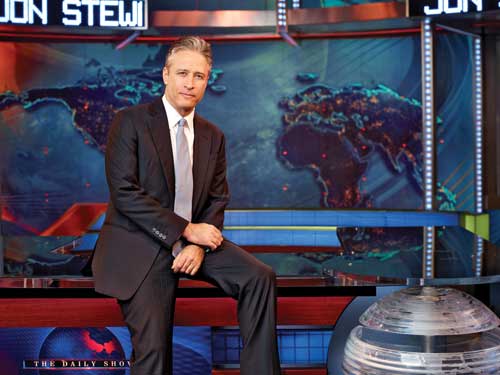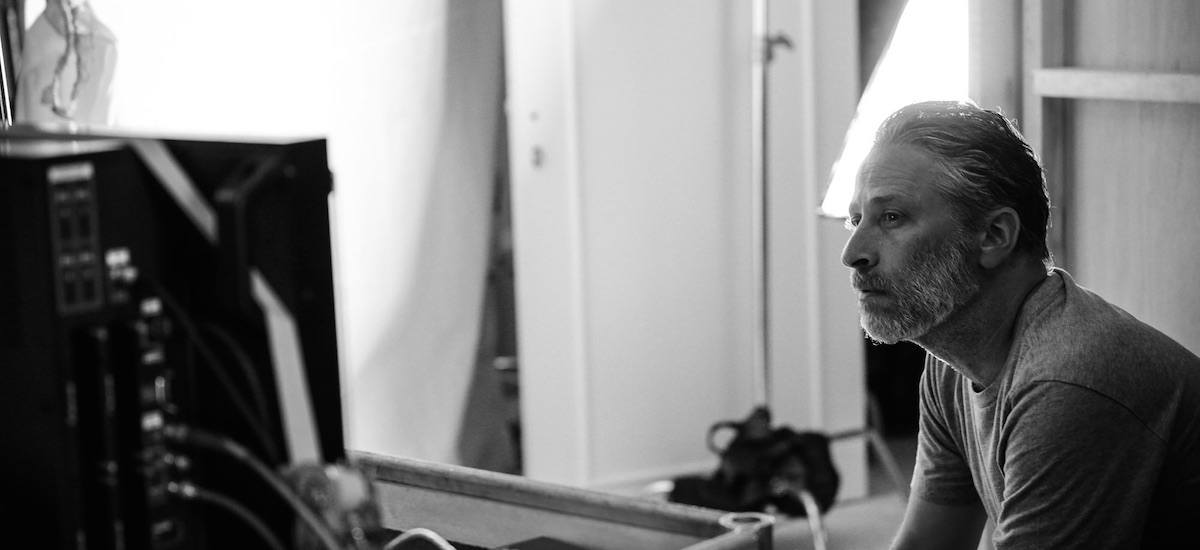Comedy Central personality Jon Stewart can now add movie director to his long and impressive resume. But that’s not why he took 10 weeks off from his successful show to make a movie. This job was about spreading a message, righting a wrong – and yeah, a little guilt.
Two years ago, television funnyman Jon Stewart stepped away from his satirical news desk on “The Daily Show” to take on a new role: movie director. It was just one more accomplishment for a comedian who has come a long way from his childhood home in New Jersey. But that shouldn’t surprise anyone, because Stewart says that while growing up on the streets of Jersey, he always knew there was something big out there waiting for him.
“We grew up in that sort of middle-class existence,” he says. “My mom’s from the Bronx, and my dad was from Brooklyn. So New York City always loomed very large, but in a strange way, distant. Philadelphia and New York were kind of the polarities of it, so you always had this sense that there was something going on about an hour away. You weren’t quite sure what it was – it was pretty cool, probably about music, maybe some dancing. It left you with this sense of curiosity and a bit of that yearning. You’re close enough to these very sophisticated metropolitan hubs, and yet very grounded in kind of a nice bedrock existence. The combination of those two is a nice influence.”
That influence has taken him far. After a long career in stand-up, Stewart hosted two shows on MTV before starting his current role as anchor of “The Daily Show” in 1999. The simple and satirical newscast format of the show has become popular among the coveted 18-34 demographic, as has the show’s knack for controversial commentary on politics and the media. Those provocative observations were exactly the reason Stewart felt compelled to write and direct “Rosewater,” released last November.
“Rosewater came by happenstance, based unfortunately on the terrible situation [journalist] Maziar Bahari found himself in,” Stewart says.
 “Our show had interviewed Maziar in Iran in 2009, prior to the election. Right after the election he was arrested and incarcerated at Evin Prison, where they showed him the tape of the segment he appeared in on our show. His captors viewed this as evidence that he was a spy. The original impetus for the film came from my own feelings of guilt and atonement over what happened to him in Iran. I met and spoke with him after the publication of his book, and the movie rolled out from there.”
“Our show had interviewed Maziar in Iran in 2009, prior to the election. Right after the election he was arrested and incarcerated at Evin Prison, where they showed him the tape of the segment he appeared in on our show. His captors viewed this as evidence that he was a spy. The original impetus for the film came from my own feelings of guilt and atonement over what happened to him in Iran. I met and spoke with him after the publication of his book, and the movie rolled out from there.”
The movie is based on Bahari’s best-selling memoir “Then They Came for Me: A Family’s Story of Love, Captivity, and Survival.” It chronicles the 42-year-old broadcast journalist’s harrowing ordeal as a political prisoner in Iran.
In June 2009, the Tehran-born Canadian citizen who lived in London returned to Iran to interview Mir-Hossein Mousavi, the prime challenger to incumbent president Mahmoud Ahmadinejad. After submitting camera footage of the unfolding street riots to the BBC, Bahari was arrested by the Revolutionary Guard police, led by a man identifying himself as Rosewater. The character-driven movie focuses on Rosewater’s torture and interrogation of Bahari over 118 days, until he was eventually freed.
Stewart didn’t know his show’s footage had been used as evidence until after Bahari was released. Once Bahari was back in the States, the two began meeting regularly for breakfast while the freed journalist was writing his memoir. The plan was for Stewart to simply help get the book made into a movie, but when that process wasn’t moving quickly enough, he stepped in to write and direct.
“Obviously it helped that I had some profile. The added value was the director could go out and sell the project. You had that going for you,” Stewart says. “We also had this incredibly compelling story. What worked in our favor was we were doing it and assembling it outside of the traditional development of a film. By the time I went looking for financing, I had a script, and I had a time frame that I had to shoot in because there was only a certain amount of time I could be away from the show. I was only in L.A. for a weekend. We sent it to five or six financiers who might appreciate it, and by the end of that weekend we had our money and our time frame. My experience in the process was you just wanted to still be in the game at each stage. I wanted to write a script that was viable enough that we were still in the game. I wanted to get enough money that we would still be in the game. At each stage I wanted to keep it alive.”
Stewart took a leave of absence from The Daily Show for the entire summer of 2013 to shoot the film in Amman, Jordan. For Rosewater, Stewart needed to work differently from how he was accustomed to working on his TV program.
“Everyone on the movie set has this sort of hive mind; we’re working together nicely and somewhat insistently to achieve our mutual goal,” he says. “That is similar to the spirit of The Daily Show. But the TV show is different, because it’s more or less set to a schedule. You set your lighting rig and adjust the control-room dials, with audio at nine, so you don’t get feedback from the monitors, and then you just sit there for 15 years doing the same thing, while changing the material every day. On the Rosewater set it was much more of a carny-type environment, with people constantly packing up wagons and heading out for the next location. In the morning you’re at a Roman ruin up on the hill, by afternoon you’re in the back of a Peugeot filming and at night, you’re trying to dress someone’s house to look like a lawyer’s office.”
Because he was filming in the summer and during Ramadan, Stewart also had to manage scorching temperatures, a fasting crew and breaks for prayer five times a day.
“Our sound man Falah was very devout,” Stewart described during an NPR interview, “so we could always turn to him and say, ‘What we got here Falah?’ And he would say, ‘This first prayer is two minutes.’ Then you would wait. Then there would be 15 minutes. We would always have to judge our production schedule based on that.”
Stewart also spoke about what he thinks when he imagines himself in Bahari’s shoes. “In that scenario, in that hypothesis – and I have replayed it many times – I tend not to fare well. I tend not to be the hero of that story. I tend to break relatively quickly as I imagine going through it. But I also think it’s very difficult to place yourself under that type of circumstance and duress through pure imagination and true hypothesis.”
Stewart recognizes Bahari’s sense of humor was his saving grace and tried to carefully weave humor into a movie with grave subject matter.
“So much of that is organic – you can’t impose that on the story,” he says. “The humor comes from the reality of how absurd the situation was. Maziar is not a spy; he hasn’t done anything wrong. They’ve got to create this scenario that implicates him in some way. And there is an absurdity to this idea that regimes have a kind of monopoly on the truth. Maziar’s ability to recognize that as he was being held is one of the most remarkable things about the memoir that he wrote. Trying to capture that in its natural state, as opposed to trying to impose it upon the film, was where I tried to go with it.”
A sub-theme of Rosewater is the ever-changing role of journalism, and how social media allows for a new breed of people reporting the news.
“Because places are cutting back on the finances of journalists, a lot of them are out there without the infrastructure and support of these big news organizations,” Stewart says.“They’re freelancing, and they’re on their own. Even when you look at a case like James Foley [the American journalist who was beheaded by ISIS], this is a guy that was kidnapped by locals, and they sold him to ISIS.
“It’s the type of situation that you are in great peril and you don’t know where it is, and it’s all for the hope of capturing things that are happening in parts of the world that you think people should know about. And that’s something that should be revered, protected and honored. Criticism comes from disappointment in an ideal. When you recognize that ideal, it’s important to highlight it and celebrate it to try and preserve it and protect those who are risking so much to bring it.”
Several scenes in Rosewater invoke great emotion for the viewer, and even Stewart. “I absolutely cried the first time I saw the movie. It was the rough assemblage that was three-and-a-half hours long. I cried my eyes out. I said, ‘I can’t believe I spent a year and a half making a giant piece of shit, so I was very upset,’” he jokes.
“Honestly, the times I cried the most were on set. There were some very poignant, very emotional things that occurred. There was a lot of emotion in the process of making it and gratitude toward the people I know sacrificed an awful lot to be there. We got a lot of very experienced actors to work for no money in conditions that were less than ideal. The cast and department heads believed in the story and created an environment that I was really grateful for. A lot of my emotions come from that experience.”
Stewart bares his emotions every night on his show, and they usually range from frustration to amazement to anger. But despite the injustices he calls out daily, he refuses to get bogged down in negativity.
“Did you ever hear of something called Xanax? Sometimes you take it with water at night, and it’s very helpful,” he jokes. On the serious side, he adds, “It’s not so much how you retain your sense of humor. It’s like saying, ‘If you eat a lot of meat, how do you keep on digesting it?’ It is the enzyme I use to process these events. One of the things that appealed so much to me about Maziar is: you imagine you would retain that ability under duress, but it’s a hypothesis. So … for him to still be able to maintain that and to be able to utilize it as his strength and way of defeating this was an incredible, real-life experiment.”













